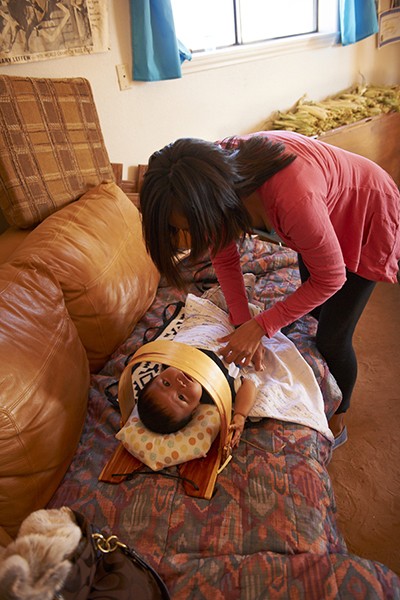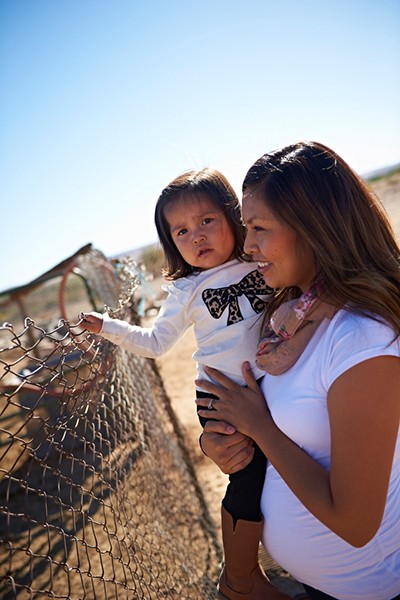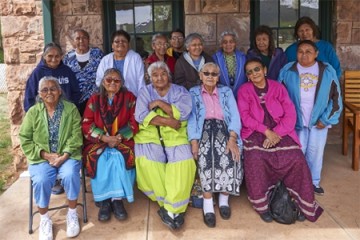A baby's first laugh, in Navajo culture, is cause for formal celebration. Whoever provokes that milestone moment wins the privilege of hosting a "first laugh ceremony" to mark the infant's full arrival into the earthly world.
"That laugh sounds to the world, 'This is me and this is who I am,'" says Crystal Kee, a Navajo health educator based in Chinle, Arizona.
Though the tradition is unique to the Navajo, Kee finds it resonates across a variety of American Indian communities that take part in Family Spirit, a home-visiting program that supports maternal and infant health.

Image caption: "There is a thirst for some connection to the culture, and the ways our ancestors and people have always thought," says Crystal Kee.
Image credit: Ed Cunicelli / Family Spirit
"There is a thirst for some connection to the culture, and the ways our ancestors and people have always thought," says Kee, who works as a training and implementation manager for Family Spirit.
The program was designed both for and by Native tribal communities. It grew out of the Johns Hopkins Center for American Indian Health in the mid-1990s, when program leaders began working in partnership with the Navajo Nation and White Mountain Apache and San Carlos Apache tribes.
Today Family Spirit is active in more than 100 tribal communities across 16 states, with the Hopkins center—part of the Bloomberg School of Public Health—disseminating the model to affiliate health centers and organizations.
The program trains people from the local community to deliver regular one-on-one home visits to mothers (and often fathers, too) from pregnancy through the first three years of the child's life. The general goal is to share best practices for parenting and early childhood health, covering topics like budgeting and breastfeeding.
But because the program is so personalized, it often wades into deeper issues the families are facing, such as employment challenges or drug abuse. Kee notes that opioid and methamphetamine problems are on the rise for tribal communities, requiring "patience and care" from Family Spirit home visitors while they "remain neutral."
Also see
And since many participants in Family Spirit are still in their teens and early 20s, the program often grapples with the risks and complexities of parenting at a young age.
With evidence showing successful outcomes—including decreases in depression and emotional problems for mothers, and reduced behavioral problems for their children—Family Spirit has expanded over the years beyond its initial rural settings in Arizona and New Mexico. It's now used in several urban communities with American Indian populations, including in Oakland, California, and Oklahoma City.
Beyond that, the program is showing promise even for non-tribal communities—an adapted model has served low-income, predominantly black or Latino populations at sites in St. Louis and Chicago, according to Kee.
"We get a lot of requests for translating the curriculum into Spanish," she says.
In addition to reaching out to other populations, Nicole Neault, a field manager for Family Spirit, says future directions may include digitizing the curriculum and continuing to build an offshoot model, Family Spirit Nurture, that targets childhood obesity.

Image caption: Family Spirit trains people from the local community to deliver regular home visits to new mothers (and fathers, too) from pregnancy through the first three years of the child's life.
Image credit: Ed Cunicelli / Family Spirit
One critical factor for the future of this program, however, rests in a funding decision Congress must make over the next few days.
Family Spirit and other models like it have relied on funding support from the federal Maternal, Infant, and Early Childhood Home Visiting, or MIECHV, program, which was first authorized in the 1980s but is now set to expire by the end of September. As of last week, the debate in Congress was ongoing about the best ways to continue with MIECHV.
For Family Spirit, the end of MIECHV funding would be a huge loss for many of its community affiliates, according to Neault.
Kee, speaking on this issue with the Native America Calling radio program last week, touted the value of Family Spirit in reducing the health disparities for tribal communities throughout their lifetimes—thus reducing long-term costs for healthcare and social services.
In a conversation The Hub, Kee emphasized the make-or-break impact home visits can have for parents and their children.
"Sometimes you are the only person who is being the cheerleader, in a sense, for these families," she says. "Sometimes you're the only person who's telling them they're doing good."
For more information on the Family Spirit program, visit http://jhsph.edu/caih/familyspirit or email familyspirit@jhu.edu.
Posted in Health, Politics+Society
Tagged maternal health, infant health, american indians, center for indigenous health








